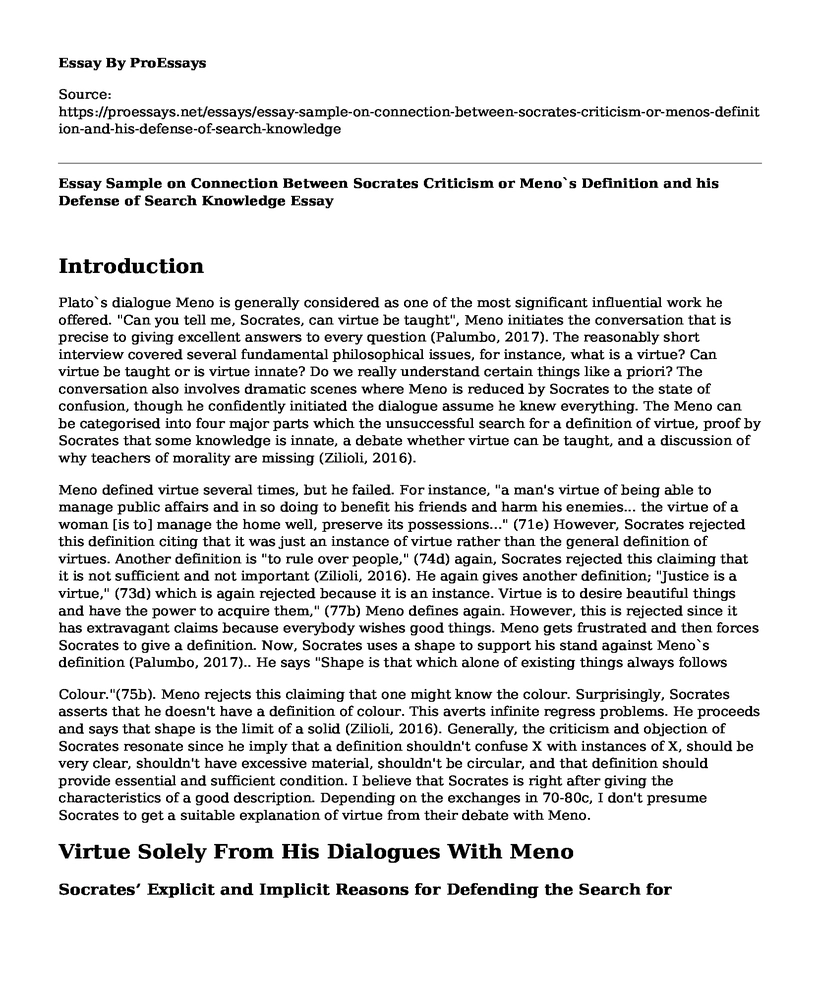Introduction
Plato`s dialogue Meno is generally considered as one of the most significant influential work he offered. "Can you tell me, Socrates, can virtue be taught", Meno initiates the conversation that is precise to giving excellent answers to every question (Palumbo, 2017). The reasonably short interview covered several fundamental philosophical issues, for instance, what is a virtue? Can virtue be taught or is virtue innate? Do we really understand certain things like a priori? The conversation also involves dramatic scenes where Meno is reduced by Socrates to the state of confusion, though he confidently initiated the dialogue assume he knew everything. The Meno can be categorised into four major parts which the unsuccessful search for a definition of virtue, proof by Socrates that some knowledge is innate, a debate whether virtue can be taught, and a discussion of why teachers of morality are missing (Zilioli, 2016).
Meno defined virtue several times, but he failed. For instance, "a man's virtue of being able to manage public affairs and in so doing to benefit his friends and harm his enemies... the virtue of a woman [is to] manage the home well, preserve its possessions..." (71e) However, Socrates rejected this definition citing that it was just an instance of virtue rather than the general definition of virtues. Another definition is "to rule over people," (74d) again, Socrates rejected this claiming that it is not sufficient and not important (Zilioli, 2016). He again gives another definition; "Justice is a virtue," (73d) which is again rejected because it is an instance. Virtue is to desire beautiful things and have the power to acquire them," (77b) Meno defines again. However, this is rejected since it has extravagant claims because everybody wishes good things. Meno gets frustrated and then forces Socrates to give a definition. Now, Socrates uses a shape to support his stand against Meno`s definition (Palumbo, 2017).. He says "Shape is that which alone of existing things always follows
Colour."(75b). Meno rejects this claiming that one might know the colour. Surprisingly, Socrates asserts that he doesn't have a definition of colour. This averts infinite regress problems. He proceeds and says that shape is the limit of a solid (Zilioli, 2016). Generally, the criticism and objection of Socrates resonate since he imply that a definition shouldn't confuse X with instances of X, should be very clear, shouldn't have excessive material, shouldn't be circular, and that definition should provide essential and sufficient condition. I believe that Socrates is right after giving the characteristics of a good description. Depending on the exchanges in 70-80c, I don't presume Socrates to get a suitable explanation of virtue from their debate with Meno.
Virtue Solely From His Dialogues With Meno
Socrates’ Explicit and Implicit Reasons for Defending the Search for Universal Knowledge
Even though relativism emerged genuine concerns, Socrates believed that self-knowledge is a vital condition for a good life. So he argued that if knowledge can be learnt, then virtue too can be determined. According to him, "the unexamined life is not worth living." Therefore, an individual must acquire knowledge and wisdom before personal interest. He also believes that what an individual knows dictates his or her conscience or soul and thus knowledge is sought as a manner of ethical action (Sharpe, 2017).
The Discrepancies That Characterise the Relativistic Positions Defended in the Articles
Relativism refers to the notion that views are comparative to differences in discernment and considerations. According to this theory, there is not universal, objective truth but each point of view bears its truth. This thinking is revealed in through the opponents, Plato and Socrates in their argument. According to Protagoras, only human beings are real- their knowledge, acting, living, emotions and intellect (Zilioli, 2016). But the pre-sophist don't care or are not concerned with the reality, considered natural truth especially the spiritual underpinnings. In the dialogue, Socrates tries to find out how humans could become virtuous, whether they have access to any kind of objective truth or knowledge. In the debate, it emerges that the unaided faculty of human reason seems to be incapable of pursuing and of getting objective without already knowing. Actually, this the Meno's dilemma. Soup to this far, it would seem the quest for, and acquisition of objective knowledge is not possible for human beings. And now, without the potential of such experience, the only left alternative is merely relativism (Zilioli, 2016). Here, the truth assertions are defined on the strength of their rhetorical persuasiveness without referring to objective reality.
Conclusion
Socrates validates that the only datum or reference to Meno`s dilemma is the existence of 'true opinion' which makes up the intellectual suspicion formed by gods. According to him, True opinions authorize human beings a preview of the objective truth that is incredible by reason alone
References
Palumbo, L. (2017). Soul, Triangle and Virtue. On the Figure of Implicit Comparison in Plato's Meno. Peitho. Examine Antiqua, (1 (8)), 201-212. https://pressto.amu.edu.pl/index.php/peitho/article/view/12225
Sharpe, M. (2017). Socrates reborn?: Philosophy, after the disciplines [Book Review]. Arena Journal, (47/48), 305.
Zilioli, U. (2016). Protagoras and the Challenge of Relativism: Plato's Subtlest Enemy. Routledge. https://www.taylorfrancis.com/books/9781317074472
Cite this page
Essay Sample on Connection Between Socrates Criticism or Meno`s Definition and his Defense of Search Knowledge. (2022, Dec 01). Retrieved from https://proessays.net/essays/essay-sample-on-connection-between-socrates-criticism-or-menos-definition-and-his-defense-of-search-knowledge
If you are the original author of this essay and no longer wish to have it published on the ProEssays website, please click below to request its removal:
- Defending Walls' Arguments on Ethics and Morality
- American Dream: Annotated Bibliography
- A Humanitarian Ethical Analysis of the Attica Prison Uprising of 1971 Essay
- Putting Research on Nursing Into Practice Paper Example
- Essay Example on Comparing Plato's Cave to The Matrix: Reality and Perception
- Ethics & Standards: The Basis of Psychological Practice - Essay Sample
- Unraveling Ethical Concerns: Examining Damon Investment Company's 21% Return Claim - Free Paper







